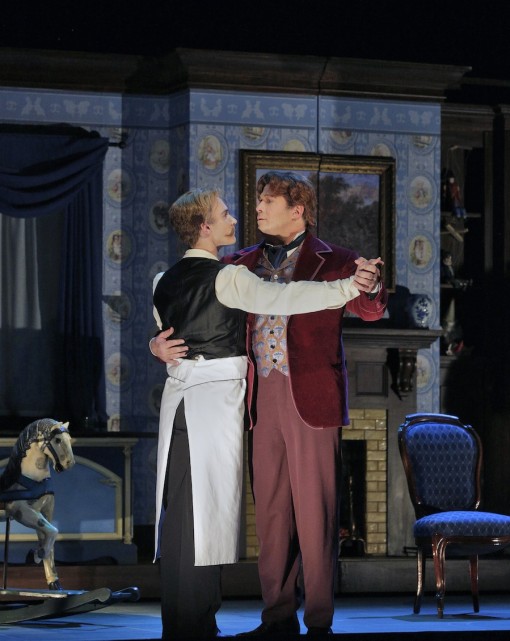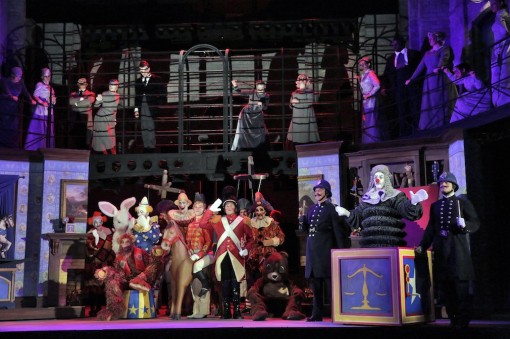Morrison’s “Oscar” proves a trial at Santa Fe Opera premiere

Reed Luplau as Bosie and David Daniels as Oscar Wilde in Theodore Morrison’s “Oscar” at Santa Fe Opera. Photo: Ken Howard
One of the best things about coming to the Santa Fe Opera each summer is the chance to hear new or at least recent operas. The company has a decorated history of world and U.S. premieres, an admirable devotion to contemporary composition to which it has stuck through thick and thin.
This year’s season was anchored on the world premiere of Oscar, heard Wednesday night, the first opera by American composer Theodore Morrison and the result of a co-commision with Opera Philadelphia, which will mount it in 2015.
You can be forgiven for not recognizing the name of Theodore Morrison, who came to composition late, in his 40s, in the midst of a career as a university choral conductor. Having taught at the Peabody Institute in Baltimore and at the University of Michigan, he has had some success in composing large-scale choral works, like his choral symphony War and Reconciliation, on poems by Walt Whitman, which was commissioned and premiered by the Choral Arts Society of Washington a few years ago. Morrison also wrote a song cycle called Chamber Music for countertenor David Daniels.
The composer and librettist, opera director John Cox, chose to ignore most of the writings for which the Irish author and acclaimed wit is remembered, to focus instead on his trial for gross indecency and imprisonment. Wilde was sexually involved with a young man named Alfred Douglas, known as “Bosie,” a liaison that caused a major scandal in Great Britain. For reasons that surpass understanding, since they were indeed in a sexual relationship, Bosie and Wilde brought charges of libel against the boy’s disapproving father, the Marquess of Queensberry, for claiming publicly that they were in a sexual relationship. Clear evidence of the relationship was introduced at court, which led to Wilde’s subsequent trial and conviction for gross indecency. Bosie, whose attachment to Wilde was always turbulent, managed to escape to the Continent and, although they were reconciled briefly after Wilde was released, Bosie later called Wilde “the greatest force for evil that has appeared in Europe during the last three hundred and fifty years.”
The downside of sponsoring new operas is that, for every success, there are many more failures, and Oscar, unfortunately, is one of those duds. This was the first opera for both Morrison and Cox, and inexperience was manifest in many ways. Ultimately, Oscar disappoints with a saccharine score, static action and an exposition-heavy libretto that too often tells us what is happening, rather than creating dramatic conflict through the characters.
The score has some beauties, especially the series of monologues for Daniels, in a lush, almost Broadway idiom, which might have worked quite well as another song cycle for David Daniels. In the second act, the well-prepared choruses of the male prisoners (directed by Susanne Sheston), to words from Wilde’s celebrated poem The Ballad of Reading Gaol, could make a nice short choral piece, which is Morrison’s strong suit. These often pleasing parts are just not knitted into a satisfying dramatic arc.
Vocally, there was little to complain about in this performance, beginning with David Daniels at the top of the cast list, who brought exceptional beauty and sensitivity to the title role. Bosie does not actually figure in the opera, except as a sort of vision of Wilde’s fantasies about his lover—represented by a graceful dancer, Reed Luplau—with none of the turbulence of their actual relationship. The ramifications of this creative decision, a sort of misfit marriage of opera and ballet, are both frustrating and revealing. On one hand, the work can never achieve either genre’s traditional dramatic goal — the pas de deux of two dancers in a ballet or the love duet of an opera — and this impossibility deflated this largely static work even more, making a sort of lap dance Bosie gives to Wilde the closest we get (choreography by Seán Curran). On the other hand, it enhanced the pathetic nature of Wilde’s character, lost as he was in a largely imaginary world. After all, plenty of operas and ballets have celebrated doomed relationships, but they exalt the power of unreasonable love through those devices, which Oscar could not quite achieve.
The libretto also got bogged down far too much in adding detail to characters other than Wilde and Bosie. Heidi Stober was on point in the high-flying part of Wilde’s friend Ada Leverson, while William Burden brought his stentorian tenor to another outspoken friend, Frank Harris (whose memoir about Wilde is one of the sources quoted in the libretto), if not Stober’s surety of intonation and pitch. Dwayne Croft’s splendid baritone was squandered on the completely unnecessary role of Walt Whitman, who introduces the story and, at the ridiculously over-the-top conclusion, ushers Wilde into the Hall of the Immortals.
At its worst Oscar hit some risibly low points, with the court scene at the bottom, here presented as an absurd monkey trial—literally, since there is a monkey, as well as clowns, marionettes, and other children’s toys. The guilty verdict is sung to the tune of Rule, Britannia! making the heavy-handed point that the Wilde trial was a mockery of justice in a way that only trivialized Wilde’s humiliation more. Kevin Burdette, who made a hilarious General Boum in La Grande Duchesse de Gérolstein the previous night, proved that he could embody any outrageous, stereotyped caricature by playing both the clown-nosed, jack-in-the-box judge and the sadistic governor of Reading Gaol, who came off like a villain in a Mel Brooks satire.
One can’t fault Santa Fe Opera for trying its best to present the piece in its best light, with conductor Evan Rogister holding things together well, in spite of a couple of early entrances here and there, from Daniels and in the orchestra. Kevin Newbury’s staging may have gone too far, especially in that court scene, but the sets by David Korins were lavish and affecting.
Oscar runs through August 17 at Santa Fe Opera. santafeopera.org
